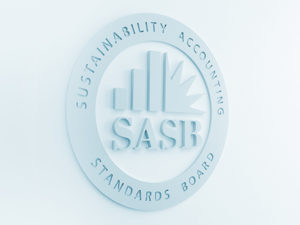This month, Associate Director Greg Waters interviews Joanne Bauer, Paul Rissman and Tanika West of Rights CoLab to discuss input on the Human Capital project.
When and why did Rights CoLab first get involved in the SASB Standards Human Capital project?
A key pillar of our work at Rights CoLab is leveraging the financial sector to improve corporate accountability for human rights. Engaging with SASB Standards became a part of our strategy because of the standards’ powerful influence in the market — with over 1,300 companies reporting against the Standards to date, and the support of large institutional investors. When the SASB Standards Board approved a series of standards-updating projects in fall 2019, we saw an opportunity. We were confident that with the strong trend towards ESG investing, both measures SASB uses to assess financial materiality — investor interest in ESG issues and evidence of financial impact — had grown exponentially since the first set of Standards was released. We thought that by using new machine learning research methods we could generate sufficient evidence of financial materiality of corporate practices to inform the revision of the standards. We also wanted to convene a group of human rights and labour experts to provide input and ensure civil society expertise had a channel into your revisions process. We approached David Parham, then the SASB Research Team lead in September 2019, and soon after embarked on our work to review and provide input on Human Capital Management in the SASB Standards.
Rights CoLab has provided input via a data science project and an expert group. Can you tell us about each?
We recruited data science graduate students through the Data for Good Scholars program at Columbia University’s Data Science Institute to help us identify new evidence of the relationships between labour-related human rights risks and financial materiality, using machine learning methods. Together, we have created promising algorithmic models for two data science workstreams — each examining a different criterion of SASB’s definition of financial materiality. We’ve just completed an update of our work, which provides more details about our methodology and findings to date.
We also established an Expert Group made up of internationally recognised human rights and labour experts, including representatives of prominent labour rights groups as well as investor groups. Expert Group members provide subject matter expertise for the data science work and provide recommendations for how to incorporate relevant findings in potential revisions of the standards. With members’ institutions, we’ve submitted several public comment letters to your stakeholder consultations, most recently on a proposed Raw Materials Sourcing project for the apparel sector. Current and former members of both groups are listed on our project website.
What resulted from your input?
In the first draft of your Human Capital Management Framework, the Labor Conditions in Supply Chains topic was out of scope. As we were working through the iterations of our machine learning models, we compiled evidence of corporate risk connected to labour conditions in supply chains to support our position that company disclosure on this topic is critical to investor understanding of human capital management of the whole company, including that company’s full value chain, and not just headquarters. You listened, and after receiving market input, included “Labor Conditions in Supply Chains” in the preliminary framework that you opened for public comment in December 2020. In our comments, we made recommendations for four priority standard-setting projects across the SASB Standards: 1) addition of metrics related to high-risk labour practices; 2) extension and improvement of disclosure metrics related to collective bargaining across all industries and workforces; 3) disaggregation by gender and race throughout human capital management metrics; and 4) crafting indicators that assess the extent and quality of human rights due diligence. We are very happy to see that the Board has approved the topic as a priority for standard setting, alongside “Diversity and Inclusion.” It’s been encouraging to see SASB’s standard-setting priorities converge with the recommendations of our Expert Group and other market feedback, and we are using the output of our data science project to support the convergence with new evidence.
What’s next for your engagement with the Human Capital project?
Looking ahead, we are focused on developing key arguments to underpin our recommendations. On the data science end, we are refining our machine learning models to support metrics development for the SASB Standards’ priority Human Capital standard-setting topics, beginning with “Diversity and Inclusion,” and “Labor Conditions in Supply Chains.” We are also building new partnerships and alliances to ensure we generate the best possible case for a strong human rights focus through forward-looking, decision-useful indicators that capture dynamic materiality.
